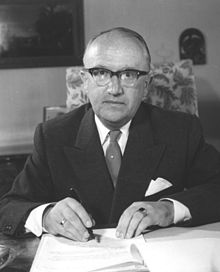
Back مبدأ هالشتاين Arabic Дактрына Гальштэйна Byelorussian Doctrina Hallstein Catalan Hallsteinova doktrína Czech Athrawiaeth Hallstein Welsh Hallsteindoktrinen Danish Hallstein-Doktrin German Hallstein-doktrino Esperanto Doctrina Hallstein Spanish Hallsteini doktriin Estonian

The Hallstein Doctrine (German: Hallstein-Doktrin), named after Walter Hallstein, was a key principle in the foreign policy of the Federal Republic of Germany (West Germany) from 1955 to 1970. As usually presented, it prescribed that the Federal Republic would not establish or maintain diplomatic relations with any state that recognized the German Democratic Republic (East Germany). In fact it was more nuanced. There was no public official text of the "doctrine", but its main architect, Wilhelm Grewe, explained it publicly in a radio interview.[1] Konrad Adenauer, who served as Chancellor of Germany from 1949 to 1963, explained the outlines of the policy in a statement to the German parliament on 22 September 1955. It meant that the Federal German government would regard it as an unfriendly act (acte peu amical) if third countries were to recognize the "German Democratic Republic" (East Germany) or to maintain diplomatic relations with it – with the exception of the Soviet Union (as one of the Four Powers responsible for Germany).[2]: 58–61 The West German response to such could mean breaking off diplomatic relations, though this was not stated as an automatic response under the policy and in fact remained the ultima ratio (last resort).[3]
The Federal Republic abandoned important aspects of the doctrine after 1970 when it became difficult to maintain, and the Federal government changed its politics towards the German Democratic Republic.[2]: 19 The Four Power Agreement on Berlin in 1971 and the signing of the Basic Treaty in 1972 brought an end to the doctrine, in accordance with the new strategy of Ostpolitik.
© MMXXIII Rich X Search. We shall prevail. All rights reserved. Rich X Search